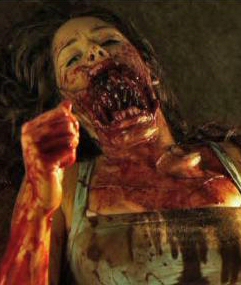
British director Johannes Roberts (Forest of the Damned, When Evil Calls) has been repeatedly kicked by critics for some of his earlier work and herein, the effect of that treatment shows - F (2010) marks a divide with his earlier style, showcasing a real change in pace and tone and creating a paranoid, cynical tale of urban gothic. I was lucky enough to see a test screening of Roberts's new film and, as much as I enjoyed elements of vampire flick Forest of the Damned (2005), F is leagues ahead.
Teacher Mr. Anderson (David Schofield) is a man at his wits' end. His teenage daughter - and pupil -Kate (Eliza Bennett) is increasingly growing away from him and he lacks the emotional know-how to engage with her. He is also struggling to accommodate the niceties of modern education practice and, on grading a pupil's paper with an 'F' (big no-no!) is the victim of an assault by that pupil. Removed from his post after this incident, he is left barely able to function. He does return to his job but it as a man in pieces; his marriage is over, his daughter estranged, and ultimately he's someone unable to understand why his conduct and not the conduct of violent students is being so scrutinised.
However it seems Mr. Anderson's paranoia about the conduct of his students may be justified after all. After school hours one evening (and after putting his daughter in a detention just to spend time with her) a group of hood-wearing kids begin an assault on the school which is by turns co-ordinated and brutal. All remaining staff and students are their targets - but will anyone listen to the warnings and pleadings of a perceived paranoid, damaged man like Anderson? The performances in the film are excellent: David Schofield gives a gripping portrayal of a flawed but decent man struggling both inwardly and outwardly with his demons, and Eliza Bennett as Kate Anderson works really effectively with him. In modern horror it can apparently be difficult to sell a film without the requisite emaciated female lead - because of course, awful things only ever happen to this group in society! - but F has the tenacity to shun this convention and it's to the film's immense credit. Schofield's increasing determination to escape the kids laying siege to his school and family is one of the film's high points.
The use of a school as a setting is itself interesting. What we have seen brilliantly in recent years is the use of light, airy, familiar spaces as the backdrops for sinister, otherworldly goings-on. The wave of 'J-horror' which reignited modern supernatural horror did this really well: horror began to move into modern office buildings, apartments, and even new technology. F continues this relocation of horror from old-world to new through its use of the school. These are places which are by their nature busy, controlled environments, both modern and safe. Make them dark, uninhabited and uncontrolled and you have the potential for a frightening experience; F makes the most of this potential and, by using some great, innovative camera work and lighting has managed to craft a deeply unsettling urban environment.
With regards to the attacking gang, the film is an interesting development in the oeuvre of 'kids gone bad' movies: these kids hunt in packs and are meaner, not cleverer, than their earlier film counterparts. But this is not simply another entry in a genre which has (tellingly) been very much reignited in recent years. The 'hoodies' here are completely anonymous, physically superior and omnipresent - in fact they operate more as supernatural/superhuman entities than as characters. At one level this can be seen as an indication of just how afraid we are of our youth and our limitations in dealing with them - but F does more than that, because ultimately the film is a story of a man repairing his relationship with his daughter at any costs and under the most terrifying circumstances.
The film's conclusion gave me some pause for thought -I'd say it's a grower, although my first instinct was to want more plot exposition. After thinking about what the ending actually means for the film I accept how it works and how the whole film hangs together on that ending, but I think some viewers will inevitably find it problematic. However, the hallmark of a good film is that it can make you think over its elements after the credits roll. By turns appallingly bleak and unsettlingly tense, F is a story of personal redemption and a skilful exercise in modern British horror. Look out for it when it gets its release this autumn.
Review by Keri O'Shea
| Directed by Johannes Roberts |